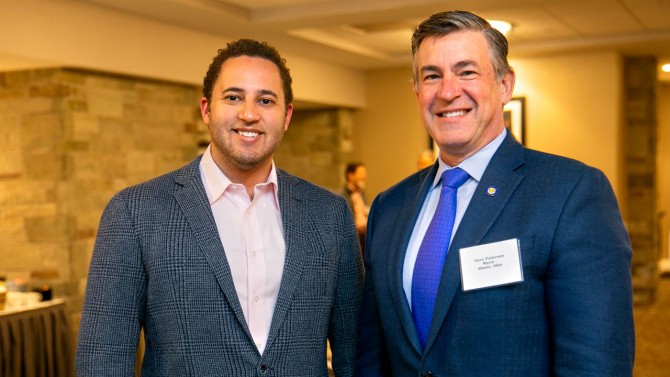Regional Town-Gown Conference takes on transportation
By Nancy Doolittle
Whether by bike, car, bus or foot, on rural roads or city streets, the logistics and challenges of transportation – of getting people and things where they need to go – were the focus of the fourth annual Cornell University Regional Town-Gown Conference, March 26.
Attended by about 80 city planners, legislators and college and university administrators in The Hotel at Ithaca, the conference was organized by Cornell’s Office of Community Relations and held in concert with the International Town & Gown Association (ITGA).
It showcased a wide range of approaches to recurring transportation challenges.
Some, such as the unconventional personal transit system implemented by West Virginia University in the 1970s, never became well-known but are intriguing because of the number of people they move and the nearly continuous service they provide. Others span multiple jurisdictions and merge traditional mass transit services with new technologies to meet the diverse, individualized needs of their users.
Still others address sustainability concerns, some by promoting bikes and walkways and some by providing clean electric and propane car stations for alternative fuel vehicles. Almost all involve partnerships between government entities, universities and businesses.
“Transportation is so critical to the work that Cornell does in partnership with the city and with our surrounding communities,” said Joel Malina, Cornell’s vice president for university relations. “We’re pleased so many of you are traveling to be here today to celebrate partnerships and to learn from each other.”
Ithaca Mayor Svante Myrick ’09 noted that Ithaca has been voted the top city in the country for getting to work without using a car and is the only city in the Northeast to be listed in AARP’s Top Ten Places to Retire. Its bus service, Tompkins Consolidated Area Transit (TCAT), “connects all corners of our community to the hub which is downtown,” he said, and is funded equally by Tompkins County, the city of Ithaca and Cornell.
The recently renovated Ithaca Commons, in the heart of downtown, has also benefited from the university’s locating a branch of the Cornell Store there, he added.
West Virginia University’s Personal Rapid Transit (PRT) system serves the university and Morgantown communities, with approximately 15,000 people riding daily during the school year. PRT rail cars, built on truck chassis and powered by eco-friendly electric motors, can travel up to 30 miles per hour; each car can accommodate eight seated passengers and comfortably carry up to 20 passengers. The system has had no fatalities in its 40-year history.
Scot Vanderpool and Matt Yarrow from TCAT noted how the transit system is the backbone of connectivity among an array of alternatives. Those alternatives need to be integrated so users can easily figure out how to get from any point A to any point B. They discussed a new pilot program, “First-Mile/Last-Mile,” scheduled for the town of Dryden later in 2019, that will help residents get “door-to-door” by using such services as Gadabout and Way2Go in combination with TCAT.
David Orr, executive director of the Cornell Local Roads Program, gave an overview of the program, which holds workshops across the state for highway and public works departments on such topics as paving, drainage, engineering and highway maintenance. CLRP also provides local governments with road maintenance assessments and plans. In 2015, for instance, a partnership between the Cornell Local Roads Program and the city of Ithaca’s Department of Public Works resulted in Cornell summer interns collecting pavement condition data and, using Cornell software, producing a maintenance schedule for the city. They received a Town-Gown (TOGO) Award that December for their work.
In a closing panel discussion on bikes and scooters, Steve Patterson, mayor of Athens, Ohio (home of Ohio University), discussed “Electric Scooters in Town-Gown Environments: The Good, the Bad and the Ugly,” looking at infrastructure modifications that scooters necessitate. And Nicolette Wagoner, Chemung County’s planning commissioner, and George Kuntz, Elmira College’s director of campus engagement, discussed their work together to offer a bike rental program to meet the transportation needs of residents, while connecting the campus and downtown Elmira.
Also at the conference, Barry Bram from Pennsylvania State University gave an overview of the upcoming ITGA conference in State College, Pennsylvania, in May. Mayor Steve Patterson, of Athens, Ohio, and Cornell Associate Vice President for Community Relations Gary Stewart both serve on the ITGA board of directors.
Media Contact
Get Cornell news delivered right to your inbox.
Subscribe

